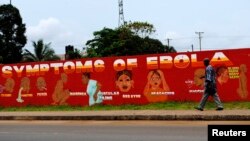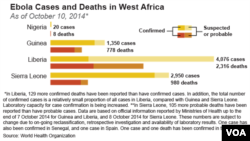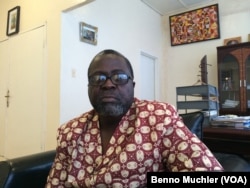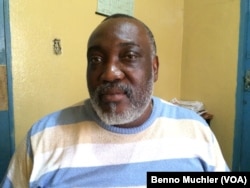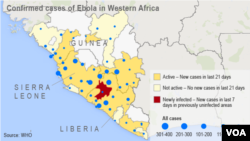As Liberia tries to end a monthslong Ebola crisis, local and international media rights groups report an intensifying crackdown on journalists in the country.
But some of those journalists say this is only a continuation of Liberia’s bad record on press freedom, which taints the West's positive image of President Ellen Johnson Sirleaf, who was Africa’s first elected female head of state and the winner of the Nobel Peace Prize in 2011.
Seven months into the worst Ebola outbreak on record, several media rights groups accuse the Liberian government of preventing journalists from reporting the magnitude of the crisis.
Last week, Liberia’s Deputy Minister of Information said on the radio that his government will prevent journalists from entering Ebola treatment units in order to protect the privacy of the patients.
However, critics see this as an attempt to hide facts about the ongoing outbreak that has killed more than 2,300 Liberians and damaged the national economy.
On October 8, the World Health Organization said, “The reported fall in the number of new cases in Liberia over the past three weeks is unlikely to be genuine” and rather reflects a lack of capacity in data gathering.
Defends practices
Liberia’s Minister of Information, Lewis Brown, said the allegations of government interference in Ebola news coverage are not true. He added that the government has always put an emphasis on strengthening press freedom.
“Even though we’re in a state of emergency ... we have not permitted ourselves to slip into a situation where we would deny free speech and freedom of information. We have not and will not," Brown said. "We fought too hard, including the president. The president is a champion for rights and freedom. All her life she fought for it.”
However, media rights groups have a different view.
Abdullai Kamara, who is the president of the Press Union of Liberia, said the government has tried to restrict the media on several occasions during the Ebola crisis.
“There is a case involving the Women Voices newspaper. The paper actually wrote about corruption within the police in respect to Ebola-related activities. And the publisher was invited to the police station and virtually harassed," Kamara said.
The Committee to Protect Journalists, an international media watchdog, said another newspaper, the National Chronicle, was raided by police citing “urgent national security concerns” as justification for their actions.
Offices raided
“During the entering, the police had thrown tear gas into our office, so we fled from the front of the office to the back, where we had the ventilation to breathe," recalled National Chronicle Publisher Philipbert Browne, who was present during the raid. " In about five minutes after they threw the tear gas, we would start to hear, BANG, BANG, the heavy sound of them breaking down the office door."
The incident took place after the National Chronicle had run a story about the plans of a group of Liberians to form a new government. But publisher Browne believes the closure of his newspaper came after the coverage of massive corruption cases including the son of President Sirleaf.
"It’s so disappointing that a woman of that stature, you know, you wouldn’t even believe it. Every day you read the newspaper, from beginning to end it’s about corruption. She does nothing about it, all right," Browne said. "She does nothing to reprimand. Every time she comes up, she appoints a panel, to investigate corruption. It ends with the panel."
The National Chronicle remains shut down while the case is being tried in Liberia's Supreme Court.
Liberia is ranked 89th out of 180 countries in the Reporters Without Borders 2014 press freedom index.




